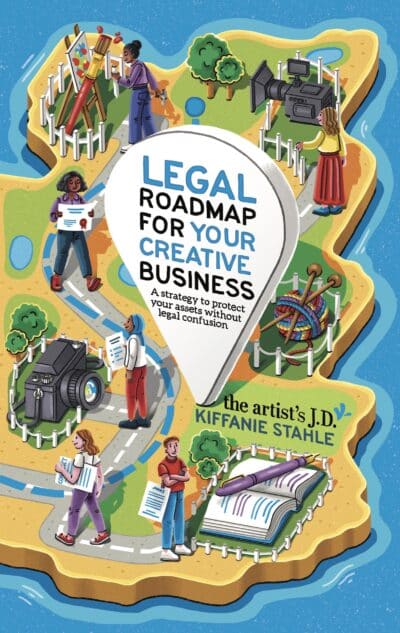For many creatives, handing over a contract is an emotionally charged experience. And this experience is even scarier when you are working with a friend.
You might worry:
- Will my friend think I don’t trust her?
- Will she think I am trying to take control?
- Will she get turned off by making things “official”?
Most people think that contracts exist to prevent you from getting screwed over, but the reality is they exist to prevent misunderstandings.
And these misunderstandings are what can ruin your friendship.
This is why I want to explain what a contract is and why for the sake of your friendship, you should push past your fears and send over a simple contract.
What a contract is
We all want happy working relationships. None of us enter relationships wanting to disappoint the other side or to not deliver what they want. (And this is even more true when we work with friends.)
But that’s the risk we run when we don’t write a contract.
When we don’t write a contract, we run the risk of unintentionally disappointing the other side. And that’s because you run the risk of the vision you have in your head not matching up with the vision they had in their head.
And so rather than thinking of a contract as a bad thing that lords over the other side, I want you to think of it as a gift. As a gift that you’re giving the other side that says “Hey, here’s everything I think that we’re doing together. This is what I’m responsible for. This is what you’re responsible for. Does that align with the vision you have in your head for this project?”
So that at the very beginning, we can clarify how the relationship will progress. You’ll nail this down before we have any hurt feelings. You’ll write it out before you unintentionally disappoint them.
A contract builds happy, strong working relationships by getting everybody on the same page–by literally getting everybody on the same page.
So while contracts get a bad rap, they make you the kindest biz owner around.
The real reason for contracts is to make sure everyone is on the same page.
Contracts do not need to be 20 pages long and full of legal jargon to be valid. Instead, a contract only needs three things to be valid:
- an offer
- acceptance of that offer
- exchange of things of value
You might say, “I will deliver 10 high-resolution headshots of you that we shoot in an hour session. And you’re allowed two clothing changes. And I will deliver the photos within 10 days of our session. And you will pay me $450.”
The other side says. “Yes, I will pay you $450 for 10 high-resolution headshots. I know I’m allowed two clothing changes and I only have an hour with you. Sounds great.”
Then you promise to exchange things of value. You say here, here’s when we will meet for our one-hour session. And they say here’s your money or here’s when I promise to pay you your money.
That is a valid contract. A valid contract can be
- a series of email exchanges
- something that is printed and signed
- a PDF that is electronically signed
- done via Honeybook or one of those services that allow you to create a template and use it for every client
It can be done in a lot of different ways.
However, you need to lay out those three things. You need to lay out this is what I need from you. This is what you need for what you’ll get from me. This is what we’re exchanging in the process. And then you’ve got a valid contract.
Does your business have a simple contract?

Inside my book, I include a simple contract template that you can use with those you work with. I also break down why legalese isn’t a requirement for a valid contract. The book also gives you a straightforward strategy to protect your ass(ets) without legal confusion. It’s the go-to guide you need to get all your legal ducks in a row.
(If you use the above Amazon affiliate link, I’ll make a small commission, but it doesn’t change the price you pay.)
Why you should give a contract to a friend
While I think you should run your business in a way that’s authentic to you, I bet that maintaining strong relationships, building community, and respecting those you work with are all values you want your business to live up to.
This is why I want to share two stories about why you should give a contract to a friend.
A collaboration with different visions
Several years back, I had the unfortunate experience of helping with a business divorce. A few months before the “divorce”, I started working with the two women who co-owned a business to review and negotiate a new contract for their business.
During a kick-off session, I like to understand how this contract might fit in with the larger business goals. So I asked them their goals for their business and how they thought this contract would help them accomplish those goals.
The answers I got were drastically different.
When I told them that I didn’t understand how both of these could live in the same business, they gave me a blank stare. They told me they agreed on the vision of the business and the person they wanted to serve. I agreed. However, I saw conflicts between the ways that they both intended to execute that vision and serve those people. We ended up spending an hour talking about the differences in the direction they wanted to take their business. And that ultimately one of them would have to sacrifice their execution plan.
What started as an exciting call about a potential business opportunity quickly changed. After the call, they had some tough conversations and decided to go their separate ways.
I got cards from both of them a few weeks later. To my surprise they said much of the same thing, thank you for making us have those conversations. They both said that they plan on being friends after this experience. (And they are.) Both of them said they were starting to feel some tension because of these differences. And that if they hadn’t had those conversations now, they likely would have lost their friendship too.
An acquaintance gets ghosted
Meighan O’Toole shared a few years back about the time she hired an acquaintance. She liked what she saw online and from her in-person social interactions. And so when she needed the service this acquaintance offered, she reached out.
The first meeting went well. The invoice was paid. But she waited and waited for any word on her items.
After Meighan sent a follow-up email several weeks later, the acquaintance said she was working on things. But again several weeks passed with no contact. And once again, Meighan felt like she had to reach out to find out the status of her deliverables.
The acquaintance made excuses, and when Meighan asked for a refund, she said she couldn’t do that and would get things to her shortly.
Once again, Meighan was ghosted and when she finally reached out several weeks later, the acquaintance sent over a sub-par deliverable that Meighan couldn’t use.
Meighan reports that the biggest emotion she felt from this wasn’t anger, but shame. Shame for letting herself down by not trusting her instincts. Shame for making assumptions because she was an acquaintance. Shame for not asking for a contract.
How to present a contract to a friend
When you start working with a friend, both of you are excited to work together and want to see the project succeed. But sometimes because of the friendship, you fail to have tough conversations that you would have with a stranger.
The reality is that making sure you are on the same page is even more important when you are friends.
Because you want to be friends afterward, right?
So the next time you embark on a project with a friend, summarize your conversations about the project. And then shoot her this email:
Hey lady!
I’m so excited to start working on this project with you! I value our friendship and admire what you are accomplishing in your business. I would hate to unintentionally not live up to your expectations on what I’ll be contributing to this project.
I’ve outlined what I understood our roles and responsibilities to be for this project below.
[INSERT SUMMARY]
Did I miss anything?
If I hit the nail on the head, hit reply with a yes [INSERT ANY NEXT STEPS].
Looking forward to diving in!
[YOUR NAME]
If you are the service provider, having a contract that you use with clients is going to help you look more professional. But if you are the client and you aren’t given a contract, then an email exchange can create your contract. And prevent you from paying someone and getting nothing.
Pssst, you can also check out my contract templates to use with your clients! So you can be the kindest business owner around to friends, acquaintances, and those you don’t have a prior relationship with! Click here to see all the contract templates.

Hi! I’m Kiff! I’m your friendly legal eagle (and licensed attorney).
My goal is to add ease to the legalese. And because I think basic legal resources should be available to every creative, I create a lot of free content.
If I’ve created something that has helped inject a little ease into your creative business and you would like to say “thank you”, you can make a contribution here.
If you’d like to hear more from me, I’d love to pop into your inbox every Friday morning to share additional ways to cut through the red tape and inject a little ease.
Get tips from your friendly legal eagle in your inbox…
Your privacy is important to us. Learn how we protect it here.

